Analyzing the State's Ambiguous Role in Asian Family Law Systems
VerifiedAdded on 2023/04/21
|19
|7152
|172
Essay
AI Summary
This essay examines the ambiguous role of the state in Asian jurisdictions, specifically within the realm of family law. It begins by highlighting the importance of family laws in governing individual and social life, particularly in India where these laws are often influenced by religion and custom. The essay discusses the challenges in implementing a Uniform Civil Code due to multiculturalism and religious diversity, and explores various secular and religious laws impacting family matters, including the Special Marriage Act, Hindu Marriage Act, and Muslim Women (Protection of Rights on Divorce) Act. Furthermore, it analyzes legislation addressing social issues like dowry and domestic violence, and concludes by emphasizing the ongoing need for legal reforms that balance cultural traditions with principles of equality and justice. Desklib provides access to similar essays and study resources for students.
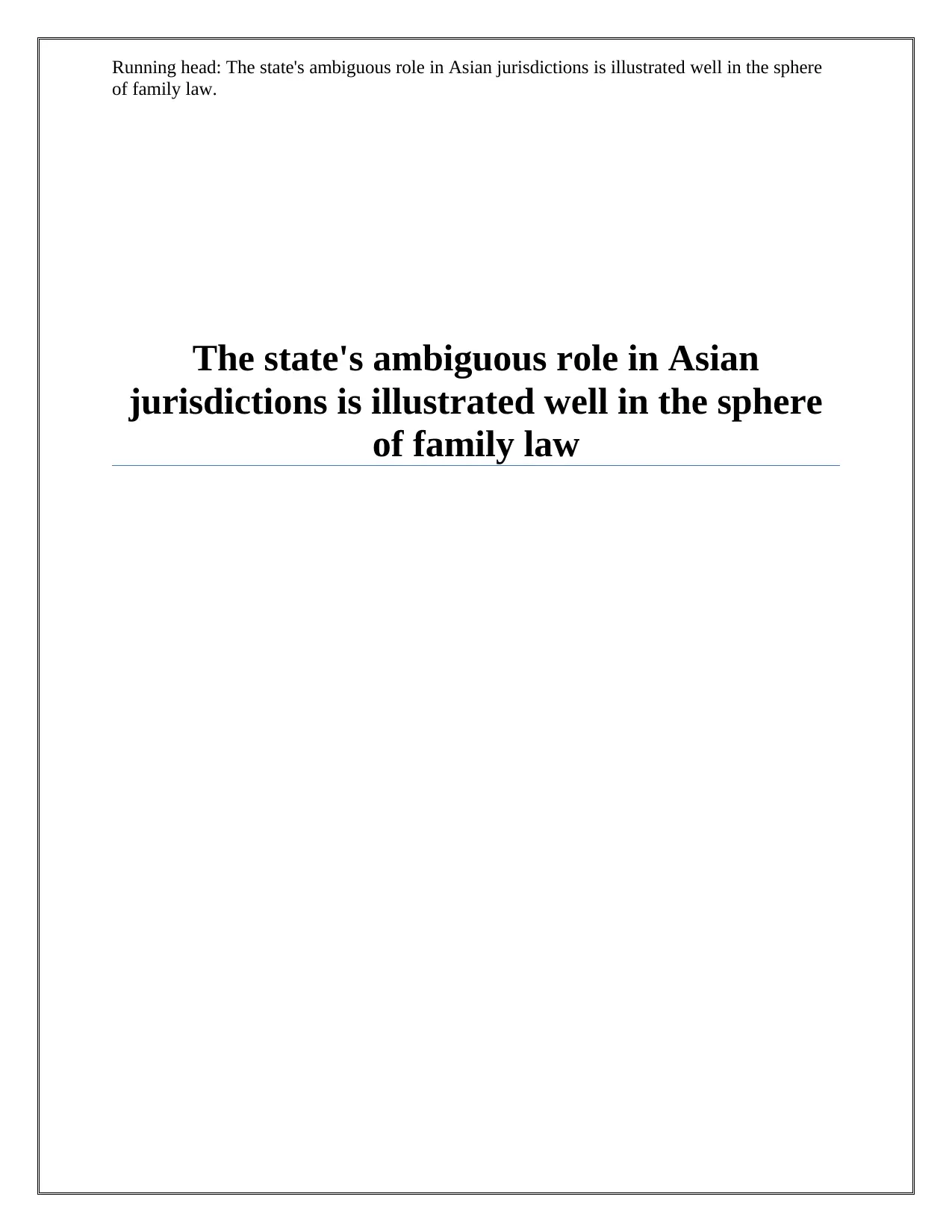
Running head: The state's ambiguous role in Asian jurisdictions is illustrated well in the sphere
of family law.
The state's ambiguous role in Asian
jurisdictions is illustrated well in the sphere
of family law
of family law.
The state's ambiguous role in Asian
jurisdictions is illustrated well in the sphere
of family law
Paraphrase This Document
Need a fresh take? Get an instant paraphrase of this document with our AI Paraphraser
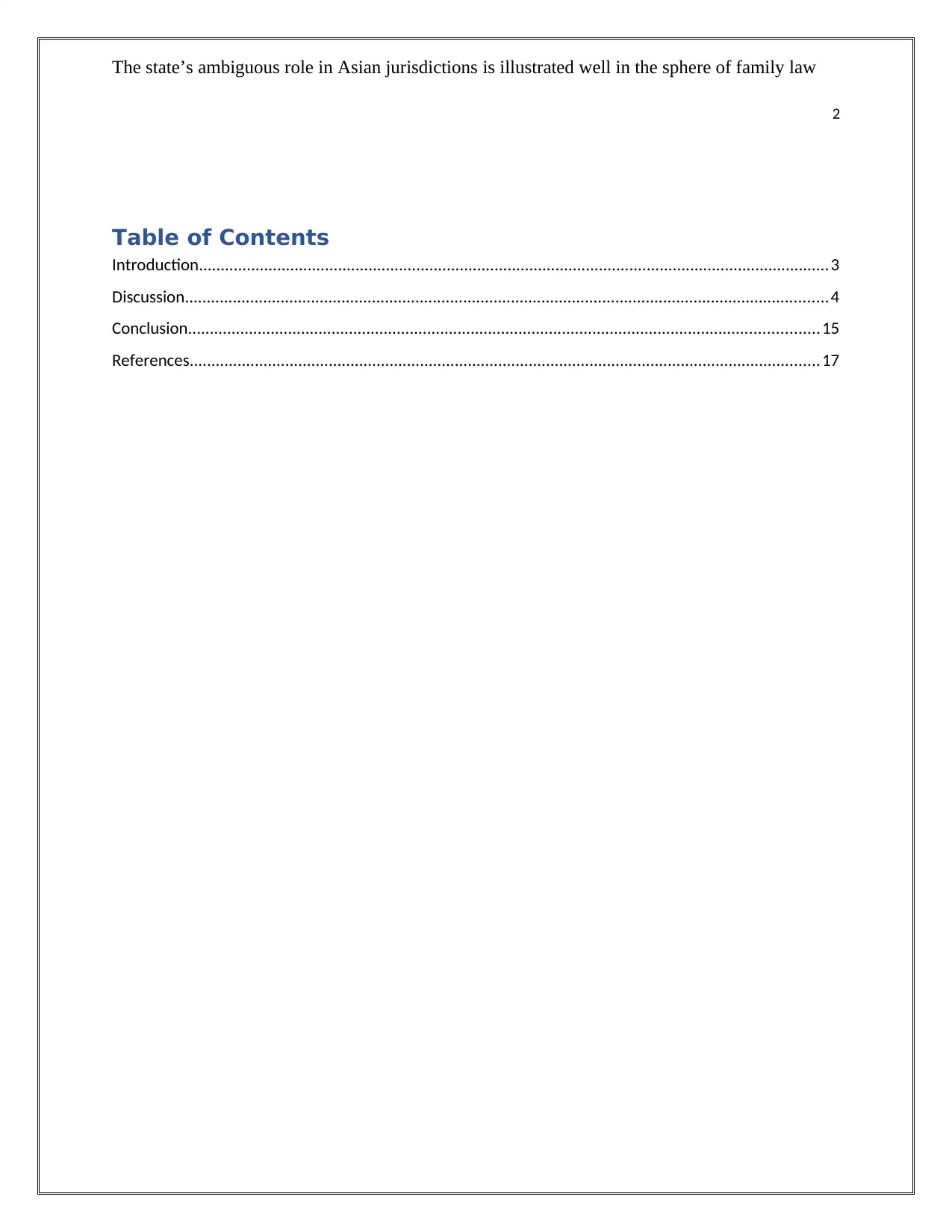
The state’s ambiguous role in Asian jurisdictions is illustrated well in the sphere of family law
2
Table of Contents
Introduction.................................................................................................................................................3
Discussion....................................................................................................................................................4
Conclusion.................................................................................................................................................15
References.................................................................................................................................................17
2
Table of Contents
Introduction.................................................................................................................................................3
Discussion....................................................................................................................................................4
Conclusion.................................................................................................................................................15
References.................................................................................................................................................17
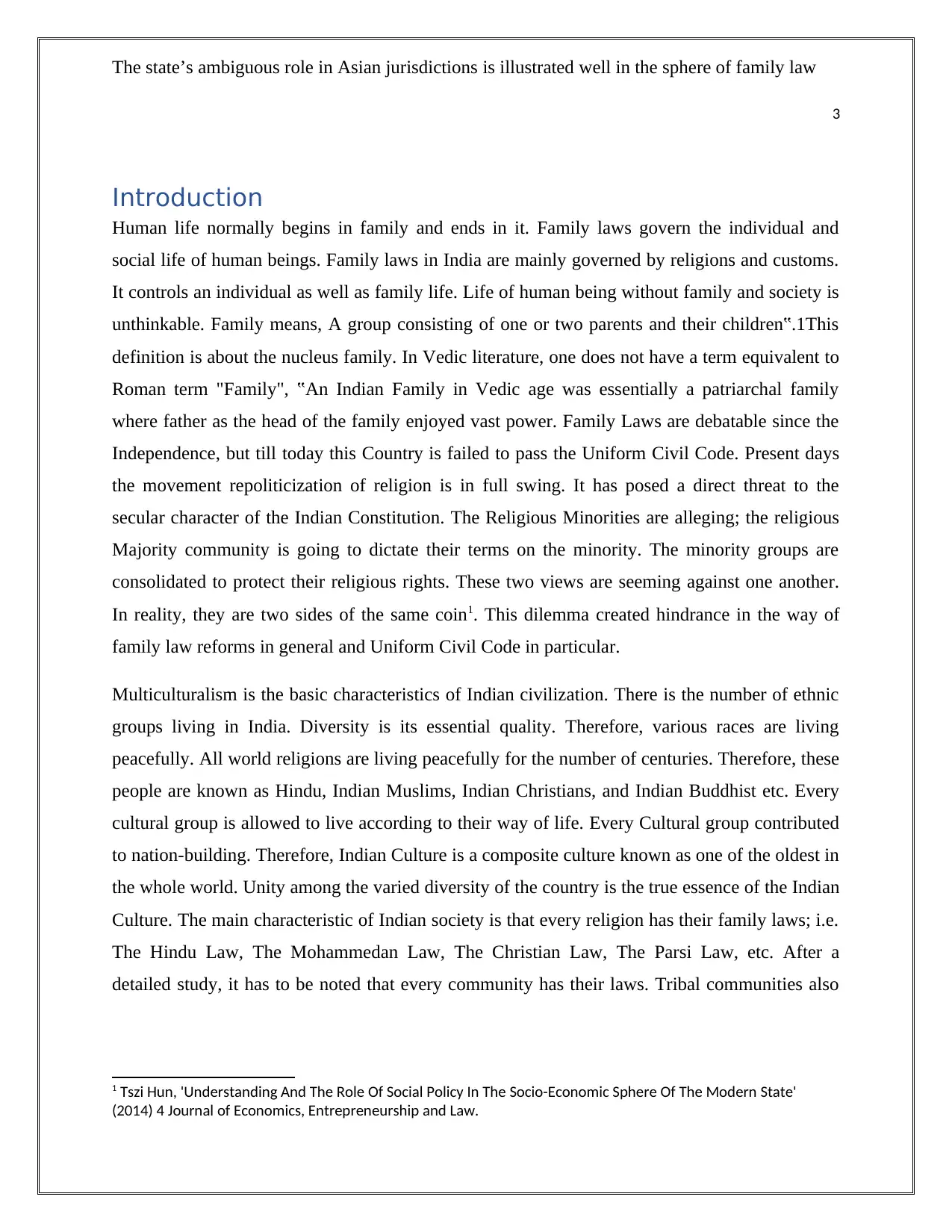
The state’s ambiguous role in Asian jurisdictions is illustrated well in the sphere of family law
3
Introduction
Human life normally begins in family and ends in it. Family laws govern the individual and
social life of human beings. Family laws in India are mainly governed by religions and customs.
It controls an individual as well as family life. Life of human being without family and society is
unthinkable. Family means, A group consisting of one or two parents and their children‟.1This
definition is about the nucleus family. In Vedic literature, one does not have a term equivalent to
Roman term "Family", ‟An Indian Family in Vedic age was essentially a patriarchal family
where father as the head of the family enjoyed vast power. Family Laws are debatable since the
Independence, but till today this Country is failed to pass the Uniform Civil Code. Present days
the movement repoliticization of religion is in full swing. It has posed a direct threat to the
secular character of the Indian Constitution. The Religious Minorities are alleging; the religious
Majority community is going to dictate their terms on the minority. The minority groups are
consolidated to protect their religious rights. These two views are seeming against one another.
In reality, they are two sides of the same coin1. This dilemma created hindrance in the way of
family law reforms in general and Uniform Civil Code in particular.
Multiculturalism is the basic characteristics of Indian civilization. There is the number of ethnic
groups living in India. Diversity is its essential quality. Therefore, various races are living
peacefully. All world religions are living peacefully for the number of centuries. Therefore, these
people are known as Hindu, Indian Muslims, Indian Christians, and Indian Buddhist etc. Every
cultural group is allowed to live according to their way of life. Every Cultural group contributed
to nation-building. Therefore, Indian Culture is a composite culture known as one of the oldest in
the whole world. Unity among the varied diversity of the country is the true essence of the Indian
Culture. The main characteristic of Indian society is that every religion has their family laws; i.e.
The Hindu Law, The Mohammedan Law, The Christian Law, The Parsi Law, etc. After a
detailed study, it has to be noted that every community has their laws. Tribal communities also
1 Tszi Hun, 'Understanding And The Role Of Social Policy In The Socio-Economic Sphere Of The Modern State'
(2014) 4 Journal of Economics, Entrepreneurship and Law.
3
Introduction
Human life normally begins in family and ends in it. Family laws govern the individual and
social life of human beings. Family laws in India are mainly governed by religions and customs.
It controls an individual as well as family life. Life of human being without family and society is
unthinkable. Family means, A group consisting of one or two parents and their children‟.1This
definition is about the nucleus family. In Vedic literature, one does not have a term equivalent to
Roman term "Family", ‟An Indian Family in Vedic age was essentially a patriarchal family
where father as the head of the family enjoyed vast power. Family Laws are debatable since the
Independence, but till today this Country is failed to pass the Uniform Civil Code. Present days
the movement repoliticization of religion is in full swing. It has posed a direct threat to the
secular character of the Indian Constitution. The Religious Minorities are alleging; the religious
Majority community is going to dictate their terms on the minority. The minority groups are
consolidated to protect their religious rights. These two views are seeming against one another.
In reality, they are two sides of the same coin1. This dilemma created hindrance in the way of
family law reforms in general and Uniform Civil Code in particular.
Multiculturalism is the basic characteristics of Indian civilization. There is the number of ethnic
groups living in India. Diversity is its essential quality. Therefore, various races are living
peacefully. All world religions are living peacefully for the number of centuries. Therefore, these
people are known as Hindu, Indian Muslims, Indian Christians, and Indian Buddhist etc. Every
cultural group is allowed to live according to their way of life. Every Cultural group contributed
to nation-building. Therefore, Indian Culture is a composite culture known as one of the oldest in
the whole world. Unity among the varied diversity of the country is the true essence of the Indian
Culture. The main characteristic of Indian society is that every religion has their family laws; i.e.
The Hindu Law, The Mohammedan Law, The Christian Law, The Parsi Law, etc. After a
detailed study, it has to be noted that every community has their laws. Tribal communities also
1 Tszi Hun, 'Understanding And The Role Of Social Policy In The Socio-Economic Sphere Of The Modern State'
(2014) 4 Journal of Economics, Entrepreneurship and Law.
⊘ This is a preview!⊘
Do you want full access?
Subscribe today to unlock all pages.

Trusted by 1+ million students worldwide
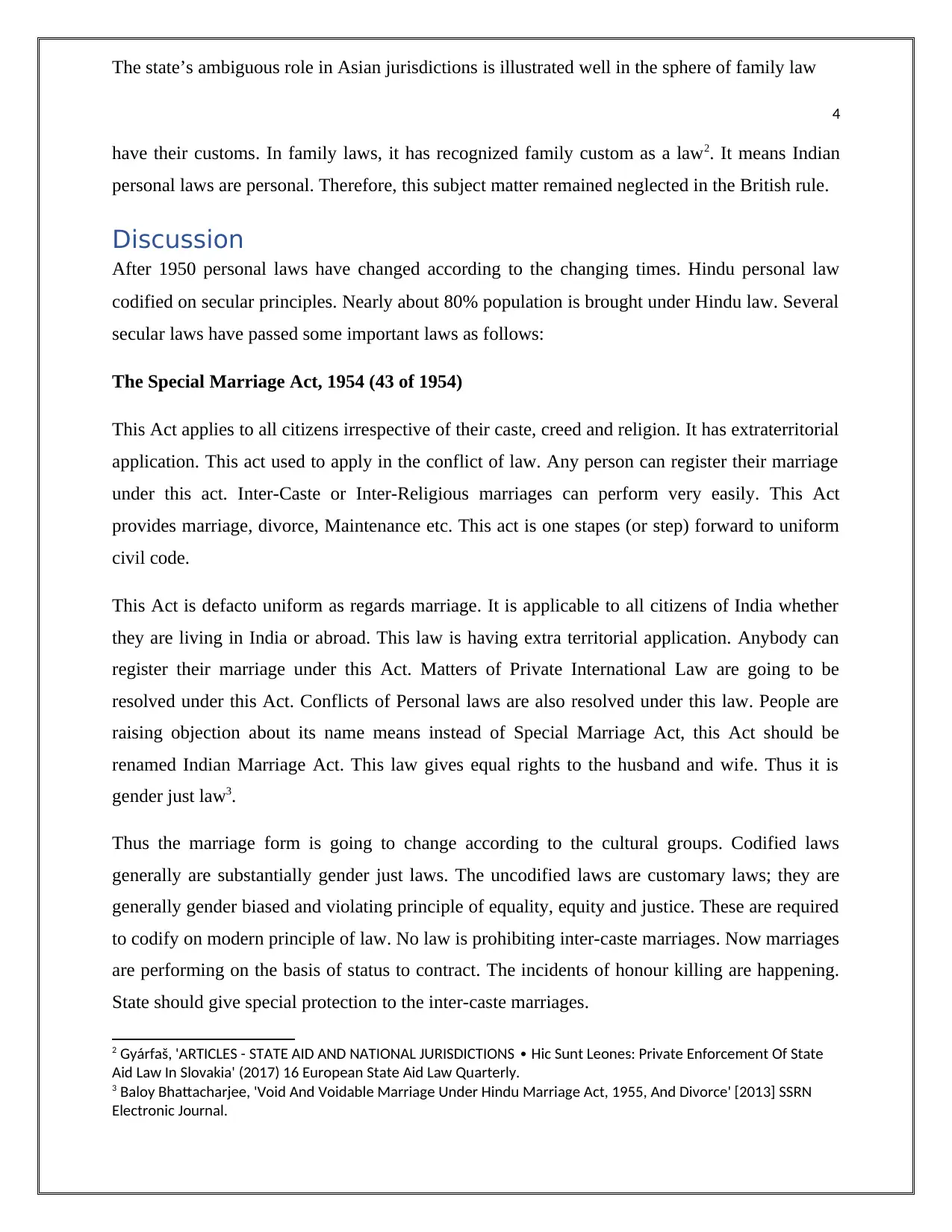
The state’s ambiguous role in Asian jurisdictions is illustrated well in the sphere of family law
4
have their customs. In family laws, it has recognized family custom as a law2. It means Indian
personal laws are personal. Therefore, this subject matter remained neglected in the British rule.
Discussion
After 1950 personal laws have changed according to the changing times. Hindu personal law
codified on secular principles. Nearly about 80% population is brought under Hindu law. Several
secular laws have passed some important laws as follows:
The Special Marriage Act, 1954 (43 of 1954)
This Act applies to all citizens irrespective of their caste, creed and religion. It has extraterritorial
application. This act used to apply in the conflict of law. Any person can register their marriage
under this act. Inter-Caste or Inter-Religious marriages can perform very easily. This Act
provides marriage, divorce, Maintenance etc. This act is one stapes (or step) forward to uniform
civil code.
This Act is defacto uniform as regards marriage. It is applicable to all citizens of India whether
they are living in India or abroad. This law is having extra territorial application. Anybody can
register their marriage under this Act. Matters of Private International Law are going to be
resolved under this Act. Conflicts of Personal laws are also resolved under this law. People are
raising objection about its name means instead of Special Marriage Act, this Act should be
renamed Indian Marriage Act. This law gives equal rights to the husband and wife. Thus it is
gender just law3.
Thus the marriage form is going to change according to the cultural groups. Codified laws
generally are substantially gender just laws. The uncodified laws are customary laws; they are
generally gender biased and violating principle of equality, equity and justice. These are required
to codify on modern principle of law. No law is prohibiting inter-caste marriages. Now marriages
are performing on the basis of status to contract. The incidents of honour killing are happening.
State should give special protection to the inter-caste marriages.
2 Gyárfaš, 'ARTICLES - STATE AID AND NATIONAL JURISDICTIONS Hic Sunt Leones: Private Enforcement Of State∙
Aid Law In Slovakia' (2017) 16 European State Aid Law Quarterly.
3 Baloy Bhattacharjee, 'Void And Voidable Marriage Under Hindu Marriage Act, 1955, And Divorce' [2013] SSRN
Electronic Journal.
4
have their customs. In family laws, it has recognized family custom as a law2. It means Indian
personal laws are personal. Therefore, this subject matter remained neglected in the British rule.
Discussion
After 1950 personal laws have changed according to the changing times. Hindu personal law
codified on secular principles. Nearly about 80% population is brought under Hindu law. Several
secular laws have passed some important laws as follows:
The Special Marriage Act, 1954 (43 of 1954)
This Act applies to all citizens irrespective of their caste, creed and religion. It has extraterritorial
application. This act used to apply in the conflict of law. Any person can register their marriage
under this act. Inter-Caste or Inter-Religious marriages can perform very easily. This Act
provides marriage, divorce, Maintenance etc. This act is one stapes (or step) forward to uniform
civil code.
This Act is defacto uniform as regards marriage. It is applicable to all citizens of India whether
they are living in India or abroad. This law is having extra territorial application. Anybody can
register their marriage under this Act. Matters of Private International Law are going to be
resolved under this Act. Conflicts of Personal laws are also resolved under this law. People are
raising objection about its name means instead of Special Marriage Act, this Act should be
renamed Indian Marriage Act. This law gives equal rights to the husband and wife. Thus it is
gender just law3.
Thus the marriage form is going to change according to the cultural groups. Codified laws
generally are substantially gender just laws. The uncodified laws are customary laws; they are
generally gender biased and violating principle of equality, equity and justice. These are required
to codify on modern principle of law. No law is prohibiting inter-caste marriages. Now marriages
are performing on the basis of status to contract. The incidents of honour killing are happening.
State should give special protection to the inter-caste marriages.
2 Gyárfaš, 'ARTICLES - STATE AID AND NATIONAL JURISDICTIONS Hic Sunt Leones: Private Enforcement Of State∙
Aid Law In Slovakia' (2017) 16 European State Aid Law Quarterly.
3 Baloy Bhattacharjee, 'Void And Voidable Marriage Under Hindu Marriage Act, 1955, And Divorce' [2013] SSRN
Electronic Journal.
Paraphrase This Document
Need a fresh take? Get an instant paraphrase of this document with our AI Paraphraser
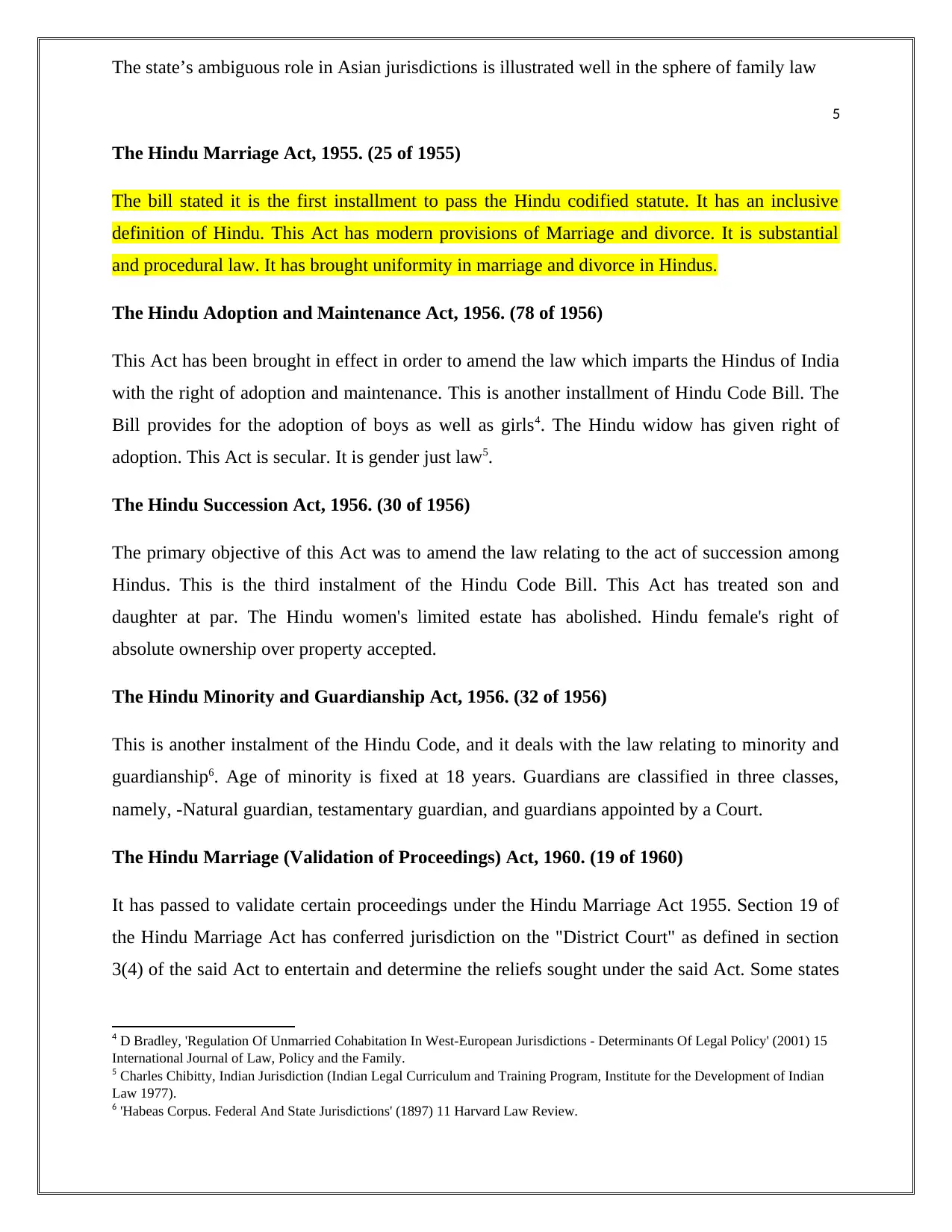
The state’s ambiguous role in Asian jurisdictions is illustrated well in the sphere of family law
5
The Hindu Marriage Act, 1955. (25 of 1955)
The bill stated it is the first installment to pass the Hindu codified statute. It has an inclusive
definition of Hindu. This Act has modern provisions of Marriage and divorce. It is substantial
and procedural law. It has brought uniformity in marriage and divorce in Hindus.
The Hindu Adoption and Maintenance Act, 1956. (78 of 1956)
This Act has been brought in effect in order to amend the law which imparts the Hindus of India
with the right of adoption and maintenance. This is another installment of Hindu Code Bill. The
Bill provides for the adoption of boys as well as girls4. The Hindu widow has given right of
adoption. This Act is secular. It is gender just law5.
The Hindu Succession Act, 1956. (30 of 1956)
The primary objective of this Act was to amend the law relating to the act of succession among
Hindus. This is the third instalment of the Hindu Code Bill. This Act has treated son and
daughter at par. The Hindu women's limited estate has abolished. Hindu female's right of
absolute ownership over property accepted.
The Hindu Minority and Guardianship Act, 1956. (32 of 1956)
This is another instalment of the Hindu Code, and it deals with the law relating to minority and
guardianship6. Age of minority is fixed at 18 years. Guardians are classified in three classes,
namely, -Natural guardian, testamentary guardian, and guardians appointed by a Court.
The Hindu Marriage (Validation of Proceedings) Act, 1960. (19 of 1960)
It has passed to validate certain proceedings under the Hindu Marriage Act 1955. Section 19 of
the Hindu Marriage Act has conferred jurisdiction on the "District Court" as defined in section
3(4) of the said Act to entertain and determine the reliefs sought under the said Act. Some states
4 D Bradley, 'Regulation Of Unmarried Cohabitation In West-European Jurisdictions - Determinants Of Legal Policy' (2001) 15
International Journal of Law, Policy and the Family.
5 Charles Chibitty, Indian Jurisdiction (Indian Legal Curriculum and Training Program, Institute for the Development of Indian
Law 1977).
6 'Habeas Corpus. Federal And State Jurisdictions' (1897) 11 Harvard Law Review.
5
The Hindu Marriage Act, 1955. (25 of 1955)
The bill stated it is the first installment to pass the Hindu codified statute. It has an inclusive
definition of Hindu. This Act has modern provisions of Marriage and divorce. It is substantial
and procedural law. It has brought uniformity in marriage and divorce in Hindus.
The Hindu Adoption and Maintenance Act, 1956. (78 of 1956)
This Act has been brought in effect in order to amend the law which imparts the Hindus of India
with the right of adoption and maintenance. This is another installment of Hindu Code Bill. The
Bill provides for the adoption of boys as well as girls4. The Hindu widow has given right of
adoption. This Act is secular. It is gender just law5.
The Hindu Succession Act, 1956. (30 of 1956)
The primary objective of this Act was to amend the law relating to the act of succession among
Hindus. This is the third instalment of the Hindu Code Bill. This Act has treated son and
daughter at par. The Hindu women's limited estate has abolished. Hindu female's right of
absolute ownership over property accepted.
The Hindu Minority and Guardianship Act, 1956. (32 of 1956)
This is another instalment of the Hindu Code, and it deals with the law relating to minority and
guardianship6. Age of minority is fixed at 18 years. Guardians are classified in three classes,
namely, -Natural guardian, testamentary guardian, and guardians appointed by a Court.
The Hindu Marriage (Validation of Proceedings) Act, 1960. (19 of 1960)
It has passed to validate certain proceedings under the Hindu Marriage Act 1955. Section 19 of
the Hindu Marriage Act has conferred jurisdiction on the "District Court" as defined in section
3(4) of the said Act to entertain and determine the reliefs sought under the said Act. Some states
4 D Bradley, 'Regulation Of Unmarried Cohabitation In West-European Jurisdictions - Determinants Of Legal Policy' (2001) 15
International Journal of Law, Policy and the Family.
5 Charles Chibitty, Indian Jurisdiction (Indian Legal Curriculum and Training Program, Institute for the Development of Indian
Law 1977).
6 'Habeas Corpus. Federal And State Jurisdictions' (1897) 11 Harvard Law Review.
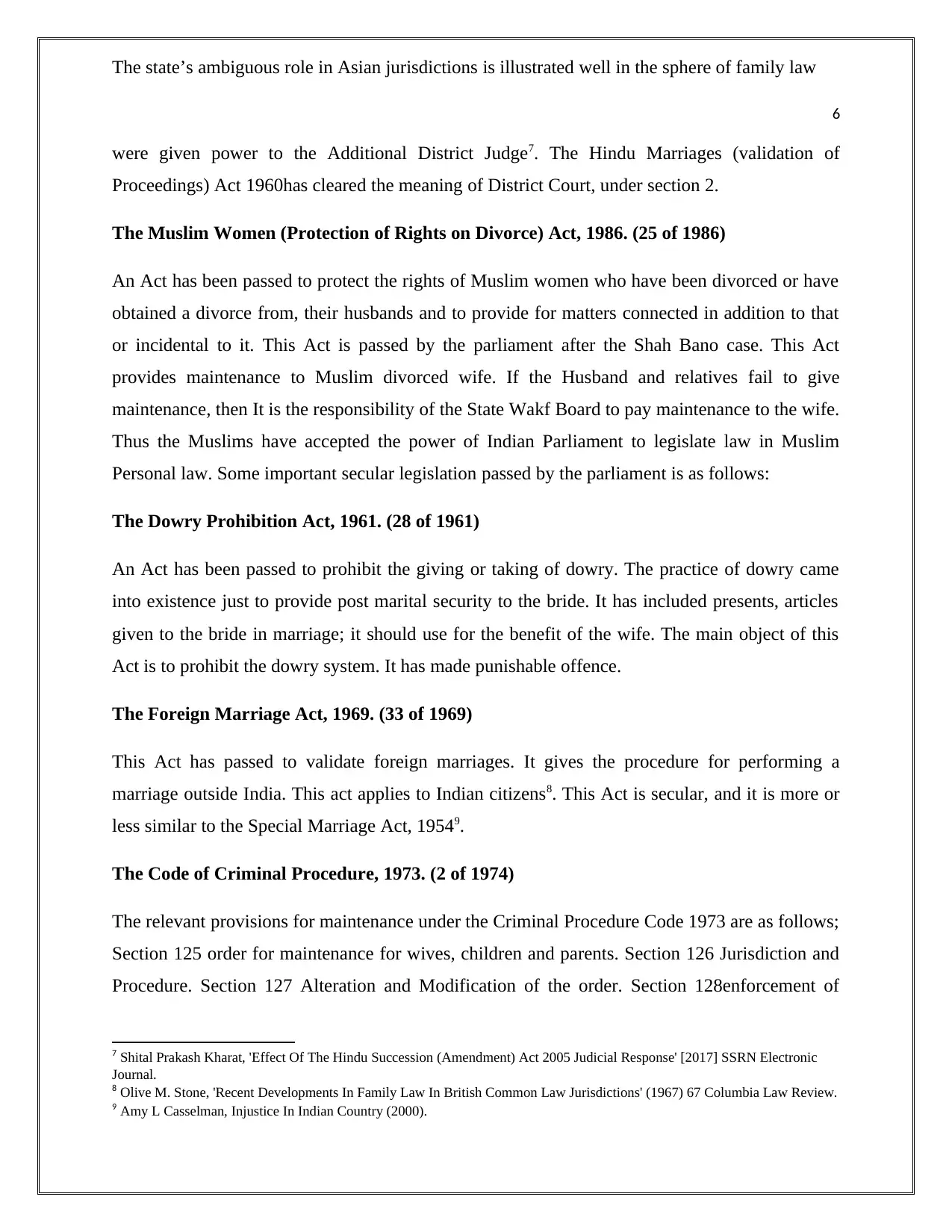
The state’s ambiguous role in Asian jurisdictions is illustrated well in the sphere of family law
6
were given power to the Additional District Judge7. The Hindu Marriages (validation of
Proceedings) Act 1960has cleared the meaning of District Court, under section 2.
The Muslim Women (Protection of Rights on Divorce) Act, 1986. (25 of 1986)
An Act has been passed to protect the rights of Muslim women who have been divorced or have
obtained a divorce from, their husbands and to provide for matters connected in addition to that
or incidental to it. This Act is passed by the parliament after the Shah Bano case. This Act
provides maintenance to Muslim divorced wife. If the Husband and relatives fail to give
maintenance, then It is the responsibility of the State Wakf Board to pay maintenance to the wife.
Thus the Muslims have accepted the power of Indian Parliament to legislate law in Muslim
Personal law. Some important secular legislation passed by the parliament is as follows:
The Dowry Prohibition Act, 1961. (28 of 1961)
An Act has been passed to prohibit the giving or taking of dowry. The practice of dowry came
into existence just to provide post marital security to the bride. It has included presents, articles
given to the bride in marriage; it should use for the benefit of the wife. The main object of this
Act is to prohibit the dowry system. It has made punishable offence.
The Foreign Marriage Act, 1969. (33 of 1969)
This Act has passed to validate foreign marriages. It gives the procedure for performing a
marriage outside India. This act applies to Indian citizens8. This Act is secular, and it is more or
less similar to the Special Marriage Act, 19549.
The Code of Criminal Procedure, 1973. (2 of 1974)
The relevant provisions for maintenance under the Criminal Procedure Code 1973 are as follows;
Section 125 order for maintenance for wives, children and parents. Section 126 Jurisdiction and
Procedure. Section 127 Alteration and Modification of the order. Section 128enforcement of
7 Shital Prakash Kharat, 'Effect Of The Hindu Succession (Amendment) Act 2005 Judicial Response' [2017] SSRN Electronic
Journal.
8 Olive M. Stone, 'Recent Developments In Family Law In British Common Law Jurisdictions' (1967) 67 Columbia Law Review.
9 Amy L Casselman, Injustice In Indian Country (2000).
6
were given power to the Additional District Judge7. The Hindu Marriages (validation of
Proceedings) Act 1960has cleared the meaning of District Court, under section 2.
The Muslim Women (Protection of Rights on Divorce) Act, 1986. (25 of 1986)
An Act has been passed to protect the rights of Muslim women who have been divorced or have
obtained a divorce from, their husbands and to provide for matters connected in addition to that
or incidental to it. This Act is passed by the parliament after the Shah Bano case. This Act
provides maintenance to Muslim divorced wife. If the Husband and relatives fail to give
maintenance, then It is the responsibility of the State Wakf Board to pay maintenance to the wife.
Thus the Muslims have accepted the power of Indian Parliament to legislate law in Muslim
Personal law. Some important secular legislation passed by the parliament is as follows:
The Dowry Prohibition Act, 1961. (28 of 1961)
An Act has been passed to prohibit the giving or taking of dowry. The practice of dowry came
into existence just to provide post marital security to the bride. It has included presents, articles
given to the bride in marriage; it should use for the benefit of the wife. The main object of this
Act is to prohibit the dowry system. It has made punishable offence.
The Foreign Marriage Act, 1969. (33 of 1969)
This Act has passed to validate foreign marriages. It gives the procedure for performing a
marriage outside India. This act applies to Indian citizens8. This Act is secular, and it is more or
less similar to the Special Marriage Act, 19549.
The Code of Criminal Procedure, 1973. (2 of 1974)
The relevant provisions for maintenance under the Criminal Procedure Code 1973 are as follows;
Section 125 order for maintenance for wives, children and parents. Section 126 Jurisdiction and
Procedure. Section 127 Alteration and Modification of the order. Section 128enforcement of
7 Shital Prakash Kharat, 'Effect Of The Hindu Succession (Amendment) Act 2005 Judicial Response' [2017] SSRN Electronic
Journal.
8 Olive M. Stone, 'Recent Developments In Family Law In British Common Law Jurisdictions' (1967) 67 Columbia Law Review.
9 Amy L Casselman, Injustice In Indian Country (2000).
⊘ This is a preview!⊘
Do you want full access?
Subscribe today to unlock all pages.

Trusted by 1+ million students worldwide
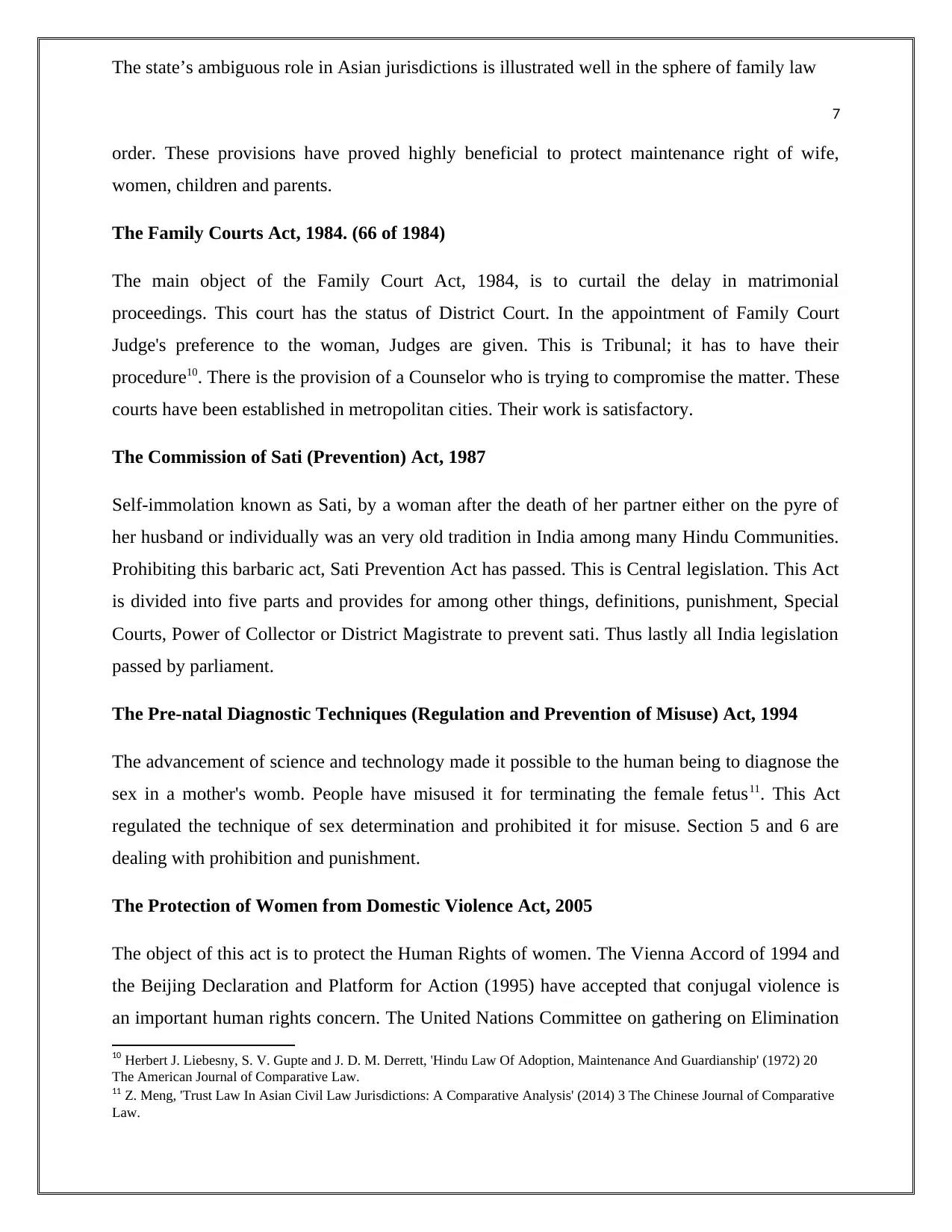
The state’s ambiguous role in Asian jurisdictions is illustrated well in the sphere of family law
7
order. These provisions have proved highly beneficial to protect maintenance right of wife,
women, children and parents.
The Family Courts Act, 1984. (66 of 1984)
The main object of the Family Court Act, 1984, is to curtail the delay in matrimonial
proceedings. This court has the status of District Court. In the appointment of Family Court
Judge's preference to the woman, Judges are given. This is Tribunal; it has to have their
procedure10. There is the provision of a Counselor who is trying to compromise the matter. These
courts have been established in metropolitan cities. Their work is satisfactory.
The Commission of Sati (Prevention) Act, 1987
Self-immolation known as Sati, by a woman after the death of her partner either on the pyre of
her husband or individually was an very old tradition in India among many Hindu Communities.
Prohibiting this barbaric act, Sati Prevention Act has passed. This is Central legislation. This Act
is divided into five parts and provides for among other things, definitions, punishment, Special
Courts, Power of Collector or District Magistrate to prevent sati. Thus lastly all India legislation
passed by parliament.
The Pre-natal Diagnostic Techniques (Regulation and Prevention of Misuse) Act, 1994
The advancement of science and technology made it possible to the human being to diagnose the
sex in a mother's womb. People have misused it for terminating the female fetus11. This Act
regulated the technique of sex determination and prohibited it for misuse. Section 5 and 6 are
dealing with prohibition and punishment.
The Protection of Women from Domestic Violence Act, 2005
The object of this act is to protect the Human Rights of women. The Vienna Accord of 1994 and
the Beijing Declaration and Platform for Action (1995) have accepted that conjugal violence is
an important human rights concern. The United Nations Committee on gathering on Elimination
10 Herbert J. Liebesny, S. V. Gupte and J. D. M. Derrett, 'Hindu Law Of Adoption, Maintenance And Guardianship' (1972) 20
The American Journal of Comparative Law.
11 Z. Meng, 'Trust Law In Asian Civil Law Jurisdictions: A Comparative Analysis' (2014) 3 The Chinese Journal of Comparative
Law.
7
order. These provisions have proved highly beneficial to protect maintenance right of wife,
women, children and parents.
The Family Courts Act, 1984. (66 of 1984)
The main object of the Family Court Act, 1984, is to curtail the delay in matrimonial
proceedings. This court has the status of District Court. In the appointment of Family Court
Judge's preference to the woman, Judges are given. This is Tribunal; it has to have their
procedure10. There is the provision of a Counselor who is trying to compromise the matter. These
courts have been established in metropolitan cities. Their work is satisfactory.
The Commission of Sati (Prevention) Act, 1987
Self-immolation known as Sati, by a woman after the death of her partner either on the pyre of
her husband or individually was an very old tradition in India among many Hindu Communities.
Prohibiting this barbaric act, Sati Prevention Act has passed. This is Central legislation. This Act
is divided into five parts and provides for among other things, definitions, punishment, Special
Courts, Power of Collector or District Magistrate to prevent sati. Thus lastly all India legislation
passed by parliament.
The Pre-natal Diagnostic Techniques (Regulation and Prevention of Misuse) Act, 1994
The advancement of science and technology made it possible to the human being to diagnose the
sex in a mother's womb. People have misused it for terminating the female fetus11. This Act
regulated the technique of sex determination and prohibited it for misuse. Section 5 and 6 are
dealing with prohibition and punishment.
The Protection of Women from Domestic Violence Act, 2005
The object of this act is to protect the Human Rights of women. The Vienna Accord of 1994 and
the Beijing Declaration and Platform for Action (1995) have accepted that conjugal violence is
an important human rights concern. The United Nations Committee on gathering on Elimination
10 Herbert J. Liebesny, S. V. Gupte and J. D. M. Derrett, 'Hindu Law Of Adoption, Maintenance And Guardianship' (1972) 20
The American Journal of Comparative Law.
11 Z. Meng, 'Trust Law In Asian Civil Law Jurisdictions: A Comparative Analysis' (2014) 3 The Chinese Journal of Comparative
Law.
Paraphrase This Document
Need a fresh take? Get an instant paraphrase of this document with our AI Paraphraser
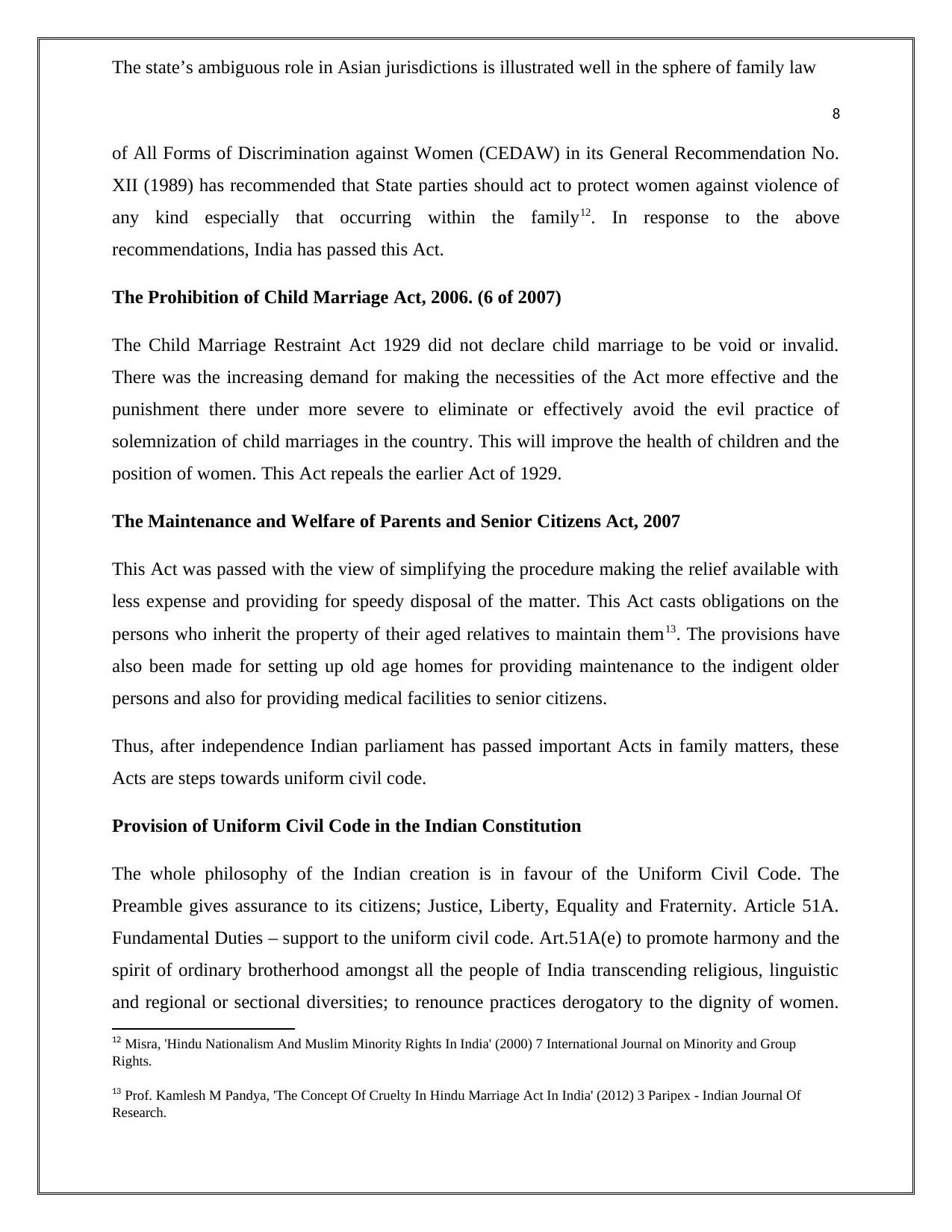
The state’s ambiguous role in Asian jurisdictions is illustrated well in the sphere of family law
8
of All Forms of Discrimination against Women (CEDAW) in its General Recommendation No.
XII (1989) has recommended that State parties should act to protect women against violence of
any kind especially that occurring within the family12. In response to the above
recommendations, India has passed this Act.
The Prohibition of Child Marriage Act, 2006. (6 of 2007)
The Child Marriage Restraint Act 1929 did not declare child marriage to be void or invalid.
There was the increasing demand for making the necessities of the Act more effective and the
punishment there under more severe to eliminate or effectively avoid the evil practice of
solemnization of child marriages in the country. This will improve the health of children and the
position of women. This Act repeals the earlier Act of 1929.
The Maintenance and Welfare of Parents and Senior Citizens Act, 2007
This Act was passed with the view of simplifying the procedure making the relief available with
less expense and providing for speedy disposal of the matter. This Act casts obligations on the
persons who inherit the property of their aged relatives to maintain them13. The provisions have
also been made for setting up old age homes for providing maintenance to the indigent older
persons and also for providing medical facilities to senior citizens.
Thus, after independence Indian parliament has passed important Acts in family matters, these
Acts are steps towards uniform civil code.
Provision of Uniform Civil Code in the Indian Constitution
The whole philosophy of the Indian creation is in favour of the Uniform Civil Code. The
Preamble gives assurance to its citizens; Justice, Liberty, Equality and Fraternity. Article 51A.
Fundamental Duties – support to the uniform civil code. Art.51A(e) to promote harmony and the
spirit of ordinary brotherhood amongst all the people of India transcending religious, linguistic
and regional or sectional diversities; to renounce practices derogatory to the dignity of women.
12 Misra, 'Hindu Nationalism And Muslim Minority Rights In India' (2000) 7 International Journal on Minority and Group
Rights.
13 Prof. Kamlesh M Pandya, 'The Concept Of Cruelty In Hindu Marriage Act In India' (2012) 3 Paripex - Indian Journal Of
Research.
8
of All Forms of Discrimination against Women (CEDAW) in its General Recommendation No.
XII (1989) has recommended that State parties should act to protect women against violence of
any kind especially that occurring within the family12. In response to the above
recommendations, India has passed this Act.
The Prohibition of Child Marriage Act, 2006. (6 of 2007)
The Child Marriage Restraint Act 1929 did not declare child marriage to be void or invalid.
There was the increasing demand for making the necessities of the Act more effective and the
punishment there under more severe to eliminate or effectively avoid the evil practice of
solemnization of child marriages in the country. This will improve the health of children and the
position of women. This Act repeals the earlier Act of 1929.
The Maintenance and Welfare of Parents and Senior Citizens Act, 2007
This Act was passed with the view of simplifying the procedure making the relief available with
less expense and providing for speedy disposal of the matter. This Act casts obligations on the
persons who inherit the property of their aged relatives to maintain them13. The provisions have
also been made for setting up old age homes for providing maintenance to the indigent older
persons and also for providing medical facilities to senior citizens.
Thus, after independence Indian parliament has passed important Acts in family matters, these
Acts are steps towards uniform civil code.
Provision of Uniform Civil Code in the Indian Constitution
The whole philosophy of the Indian creation is in favour of the Uniform Civil Code. The
Preamble gives assurance to its citizens; Justice, Liberty, Equality and Fraternity. Article 51A.
Fundamental Duties – support to the uniform civil code. Art.51A(e) to promote harmony and the
spirit of ordinary brotherhood amongst all the people of India transcending religious, linguistic
and regional or sectional diversities; to renounce practices derogatory to the dignity of women.
12 Misra, 'Hindu Nationalism And Muslim Minority Rights In India' (2000) 7 International Journal on Minority and Group
Rights.
13 Prof. Kamlesh M Pandya, 'The Concept Of Cruelty In Hindu Marriage Act In India' (2012) 3 Paripex - Indian Journal Of
Research.
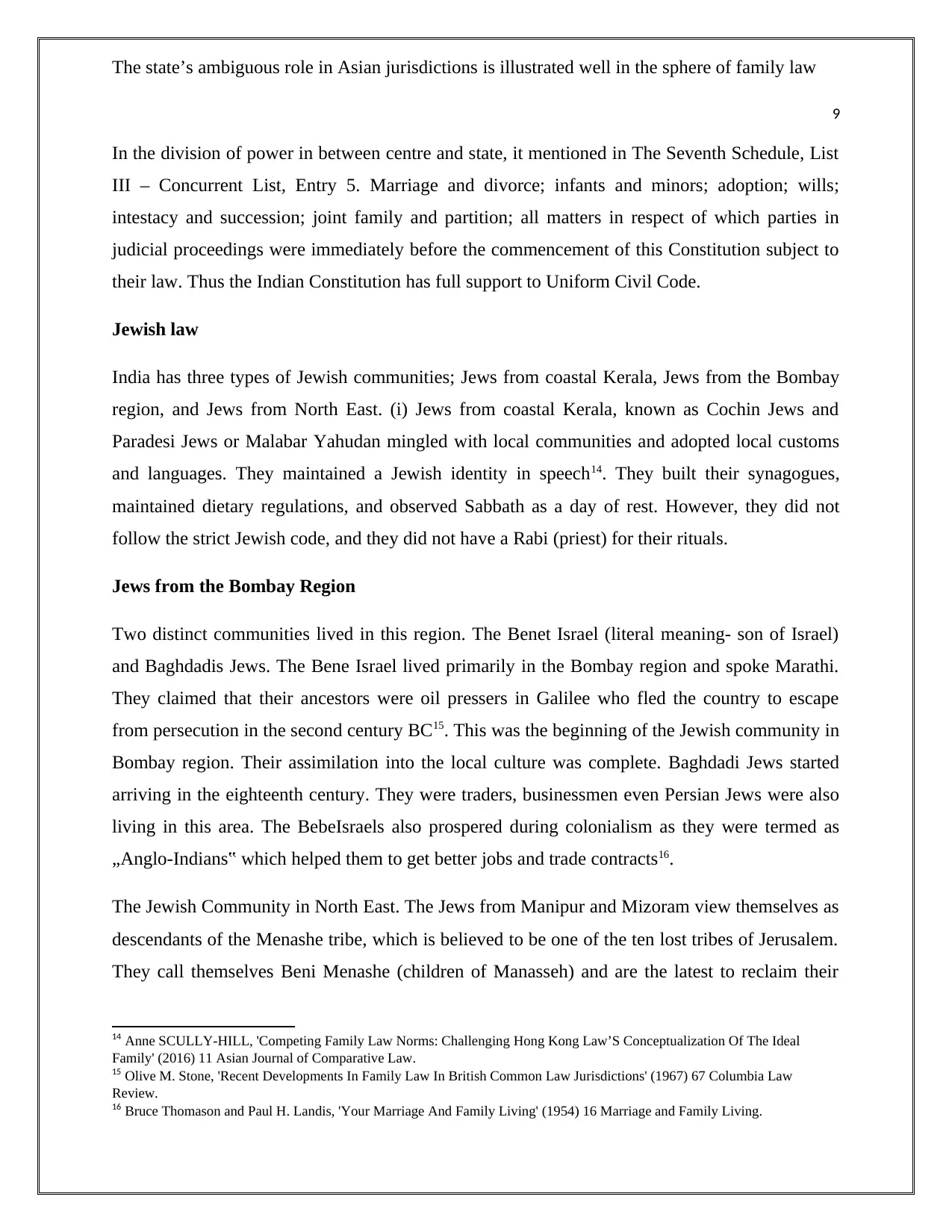
The state’s ambiguous role in Asian jurisdictions is illustrated well in the sphere of family law
9
In the division of power in between centre and state, it mentioned in The Seventh Schedule, List
III – Concurrent List, Entry 5. Marriage and divorce; infants and minors; adoption; wills;
intestacy and succession; joint family and partition; all matters in respect of which parties in
judicial proceedings were immediately before the commencement of this Constitution subject to
their law. Thus the Indian Constitution has full support to Uniform Civil Code.
Jewish law
India has three types of Jewish communities; Jews from coastal Kerala, Jews from the Bombay
region, and Jews from North East. (i) Jews from coastal Kerala, known as Cochin Jews and
Paradesi Jews or Malabar Yahudan mingled with local communities and adopted local customs
and languages. They maintained a Jewish identity in speech14. They built their synagogues,
maintained dietary regulations, and observed Sabbath as a day of rest. However, they did not
follow the strict Jewish code, and they did not have a Rabi (priest) for their rituals.
Jews from the Bombay Region
Two distinct communities lived in this region. The Benet Israel (literal meaning- son of Israel)
and Baghdadis Jews. The Bene Israel lived primarily in the Bombay region and spoke Marathi.
They claimed that their ancestors were oil pressers in Galilee who fled the country to escape
from persecution in the second century BC15. This was the beginning of the Jewish community in
Bombay region. Their assimilation into the local culture was complete. Baghdadi Jews started
arriving in the eighteenth century. They were traders, businessmen even Persian Jews were also
living in this area. The BebeIsraels also prospered during colonialism as they were termed as
„Anglo-Indians‟ which helped them to get better jobs and trade contracts16.
The Jewish Community in North East. The Jews from Manipur and Mizoram view themselves as
descendants of the Menashe tribe, which is believed to be one of the ten lost tribes of Jerusalem.
They call themselves Beni Menashe (children of Manasseh) and are the latest to reclaim their
14 Anne SCULLY-HILL, 'Competing Family Law Norms: Challenging Hong Kong Law’S Conceptualization Of The Ideal
Family' (2016) 11 Asian Journal of Comparative Law.
15 Olive M. Stone, 'Recent Developments In Family Law In British Common Law Jurisdictions' (1967) 67 Columbia Law
Review.
16 Bruce Thomason and Paul H. Landis, 'Your Marriage And Family Living' (1954) 16 Marriage and Family Living.
9
In the division of power in between centre and state, it mentioned in The Seventh Schedule, List
III – Concurrent List, Entry 5. Marriage and divorce; infants and minors; adoption; wills;
intestacy and succession; joint family and partition; all matters in respect of which parties in
judicial proceedings were immediately before the commencement of this Constitution subject to
their law. Thus the Indian Constitution has full support to Uniform Civil Code.
Jewish law
India has three types of Jewish communities; Jews from coastal Kerala, Jews from the Bombay
region, and Jews from North East. (i) Jews from coastal Kerala, known as Cochin Jews and
Paradesi Jews or Malabar Yahudan mingled with local communities and adopted local customs
and languages. They maintained a Jewish identity in speech14. They built their synagogues,
maintained dietary regulations, and observed Sabbath as a day of rest. However, they did not
follow the strict Jewish code, and they did not have a Rabi (priest) for their rituals.
Jews from the Bombay Region
Two distinct communities lived in this region. The Benet Israel (literal meaning- son of Israel)
and Baghdadis Jews. The Bene Israel lived primarily in the Bombay region and spoke Marathi.
They claimed that their ancestors were oil pressers in Galilee who fled the country to escape
from persecution in the second century BC15. This was the beginning of the Jewish community in
Bombay region. Their assimilation into the local culture was complete. Baghdadi Jews started
arriving in the eighteenth century. They were traders, businessmen even Persian Jews were also
living in this area. The BebeIsraels also prospered during colonialism as they were termed as
„Anglo-Indians‟ which helped them to get better jobs and trade contracts16.
The Jewish Community in North East. The Jews from Manipur and Mizoram view themselves as
descendants of the Menashe tribe, which is believed to be one of the ten lost tribes of Jerusalem.
They call themselves Beni Menashe (children of Manasseh) and are the latest to reclaim their
14 Anne SCULLY-HILL, 'Competing Family Law Norms: Challenging Hong Kong Law’S Conceptualization Of The Ideal
Family' (2016) 11 Asian Journal of Comparative Law.
15 Olive M. Stone, 'Recent Developments In Family Law In British Common Law Jurisdictions' (1967) 67 Columbia Law
Review.
16 Bruce Thomason and Paul H. Landis, 'Your Marriage And Family Living' (1954) 16 Marriage and Family Living.
⊘ This is a preview!⊘
Do you want full access?
Subscribe today to unlock all pages.

Trusted by 1+ million students worldwide
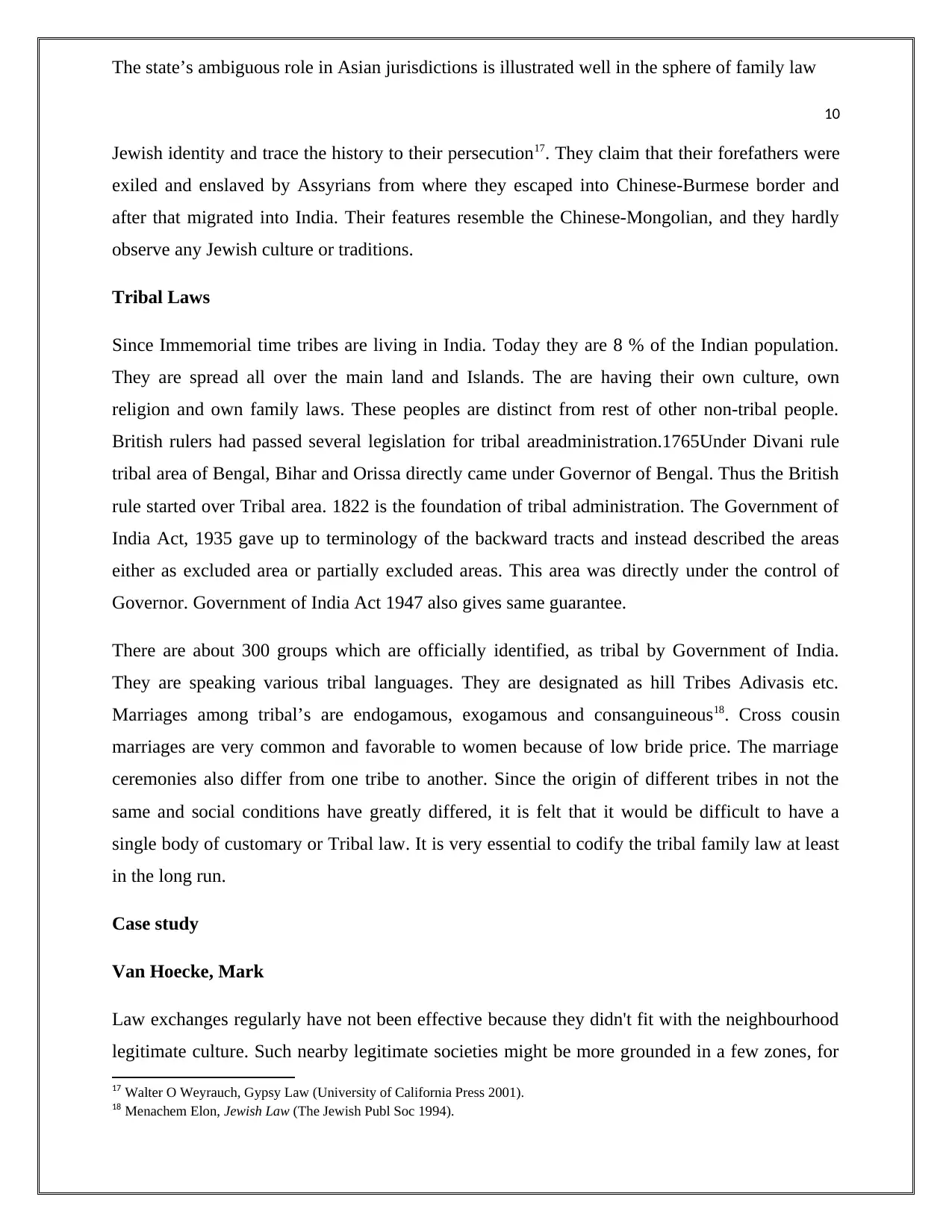
The state’s ambiguous role in Asian jurisdictions is illustrated well in the sphere of family law
10
Jewish identity and trace the history to their persecution17. They claim that their forefathers were
exiled and enslaved by Assyrians from where they escaped into Chinese-Burmese border and
after that migrated into India. Their features resemble the Chinese-Mongolian, and they hardly
observe any Jewish culture or traditions.
Tribal Laws
Since Immemorial time tribes are living in India. Today they are 8 % of the Indian population.
They are spread all over the main land and Islands. The are having their own culture, own
religion and own family laws. These peoples are distinct from rest of other non-tribal people.
British rulers had passed several legislation for tribal areadministration.1765Under Divani rule
tribal area of Bengal, Bihar and Orissa directly came under Governor of Bengal. Thus the British
rule started over Tribal area. 1822 is the foundation of tribal administration. The Government of
India Act, 1935 gave up to terminology of the backward tracts and instead described the areas
either as excluded area or partially excluded areas. This area was directly under the control of
Governor. Government of India Act 1947 also gives same guarantee.
There are about 300 groups which are officially identified, as tribal by Government of India.
They are speaking various tribal languages. They are designated as hill Tribes Adivasis etc.
Marriages among tribal’s are endogamous, exogamous and consanguineous18. Cross cousin
marriages are very common and favorable to women because of low bride price. The marriage
ceremonies also differ from one tribe to another. Since the origin of different tribes in not the
same and social conditions have greatly differed, it is felt that it would be difficult to have a
single body of customary or Tribal law. It is very essential to codify the tribal family law at least
in the long run.
Case study
Van Hoecke, Mark
Law exchanges regularly have not been effective because they didn't fit with the neighbourhood
legitimate culture. Such nearby legitimate societies might be more grounded in a few zones, for
17 Walter O Weyrauch, Gypsy Law (University of California Press 2001).
18 Menachem Elon, Jewish Law (The Jewish Publ Soc 1994).
10
Jewish identity and trace the history to their persecution17. They claim that their forefathers were
exiled and enslaved by Assyrians from where they escaped into Chinese-Burmese border and
after that migrated into India. Their features resemble the Chinese-Mongolian, and they hardly
observe any Jewish culture or traditions.
Tribal Laws
Since Immemorial time tribes are living in India. Today they are 8 % of the Indian population.
They are spread all over the main land and Islands. The are having their own culture, own
religion and own family laws. These peoples are distinct from rest of other non-tribal people.
British rulers had passed several legislation for tribal areadministration.1765Under Divani rule
tribal area of Bengal, Bihar and Orissa directly came under Governor of Bengal. Thus the British
rule started over Tribal area. 1822 is the foundation of tribal administration. The Government of
India Act, 1935 gave up to terminology of the backward tracts and instead described the areas
either as excluded area or partially excluded areas. This area was directly under the control of
Governor. Government of India Act 1947 also gives same guarantee.
There are about 300 groups which are officially identified, as tribal by Government of India.
They are speaking various tribal languages. They are designated as hill Tribes Adivasis etc.
Marriages among tribal’s are endogamous, exogamous and consanguineous18. Cross cousin
marriages are very common and favorable to women because of low bride price. The marriage
ceremonies also differ from one tribe to another. Since the origin of different tribes in not the
same and social conditions have greatly differed, it is felt that it would be difficult to have a
single body of customary or Tribal law. It is very essential to codify the tribal family law at least
in the long run.
Case study
Van Hoecke, Mark
Law exchanges regularly have not been effective because they didn't fit with the neighbourhood
legitimate culture. Such nearby legitimate societies might be more grounded in a few zones, for
17 Walter O Weyrauch, Gypsy Law (University of California Press 2001).
18 Menachem Elon, Jewish Law (The Jewish Publ Soc 1994).
Paraphrase This Document
Need a fresh take? Get an instant paraphrase of this document with our AI Paraphraser
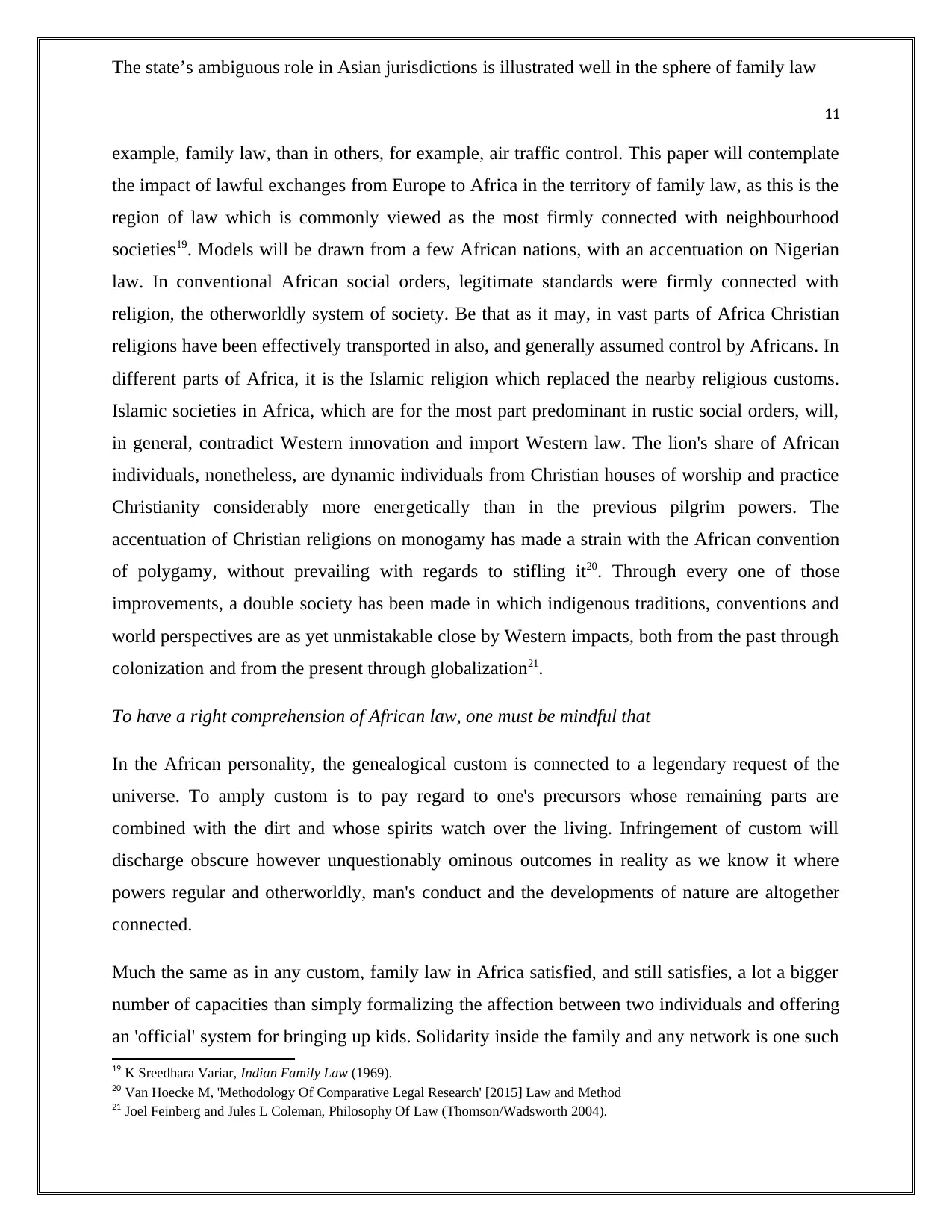
The state’s ambiguous role in Asian jurisdictions is illustrated well in the sphere of family law
11
example, family law, than in others, for example, air traffic control. This paper will contemplate
the impact of lawful exchanges from Europe to Africa in the territory of family law, as this is the
region of law which is commonly viewed as the most firmly connected with neighbourhood
societies19. Models will be drawn from a few African nations, with an accentuation on Nigerian
law. In conventional African social orders, legitimate standards were firmly connected with
religion, the otherworldly system of society. Be that as it may, in vast parts of Africa Christian
religions have been effectively transported in also, and generally assumed control by Africans. In
different parts of Africa, it is the Islamic religion which replaced the nearby religious customs.
Islamic societies in Africa, which are for the most part predominant in rustic social orders, will,
in general, contradict Western innovation and import Western law. The lion's share of African
individuals, nonetheless, are dynamic individuals from Christian houses of worship and practice
Christianity considerably more energetically than in the previous pilgrim powers. The
accentuation of Christian religions on monogamy has made a strain with the African convention
of polygamy, without prevailing with regards to stifling it20. Through every one of those
improvements, a double society has been made in which indigenous traditions, conventions and
world perspectives are as yet unmistakable close by Western impacts, both from the past through
colonization and from the present through globalization21.
To have a right comprehension of African law, one must be mindful that
In the African personality, the genealogical custom is connected to a legendary request of the
universe. To amply custom is to pay regard to one's precursors whose remaining parts are
combined with the dirt and whose spirits watch over the living. Infringement of custom will
discharge obscure however unquestionably ominous outcomes in reality as we know it where
powers regular and otherworldly, man's conduct and the developments of nature are altogether
connected.
Much the same as in any custom, family law in Africa satisfied, and still satisfies, a lot a bigger
number of capacities than simply formalizing the affection between two individuals and offering
an 'official' system for bringing up kids. Solidarity inside the family and any network is one such
19 K Sreedhara Variar, Indian Family Law (1969).
20 Van Hoecke M, 'Methodology Of Comparative Legal Research' [2015] Law and Method
21 Joel Feinberg and Jules L Coleman, Philosophy Of Law (Thomson/Wadsworth 2004).
11
example, family law, than in others, for example, air traffic control. This paper will contemplate
the impact of lawful exchanges from Europe to Africa in the territory of family law, as this is the
region of law which is commonly viewed as the most firmly connected with neighbourhood
societies19. Models will be drawn from a few African nations, with an accentuation on Nigerian
law. In conventional African social orders, legitimate standards were firmly connected with
religion, the otherworldly system of society. Be that as it may, in vast parts of Africa Christian
religions have been effectively transported in also, and generally assumed control by Africans. In
different parts of Africa, it is the Islamic religion which replaced the nearby religious customs.
Islamic societies in Africa, which are for the most part predominant in rustic social orders, will,
in general, contradict Western innovation and import Western law. The lion's share of African
individuals, nonetheless, are dynamic individuals from Christian houses of worship and practice
Christianity considerably more energetically than in the previous pilgrim powers. The
accentuation of Christian religions on monogamy has made a strain with the African convention
of polygamy, without prevailing with regards to stifling it20. Through every one of those
improvements, a double society has been made in which indigenous traditions, conventions and
world perspectives are as yet unmistakable close by Western impacts, both from the past through
colonization and from the present through globalization21.
To have a right comprehension of African law, one must be mindful that
In the African personality, the genealogical custom is connected to a legendary request of the
universe. To amply custom is to pay regard to one's precursors whose remaining parts are
combined with the dirt and whose spirits watch over the living. Infringement of custom will
discharge obscure however unquestionably ominous outcomes in reality as we know it where
powers regular and otherworldly, man's conduct and the developments of nature are altogether
connected.
Much the same as in any custom, family law in Africa satisfied, and still satisfies, a lot a bigger
number of capacities than simply formalizing the affection between two individuals and offering
an 'official' system for bringing up kids. Solidarity inside the family and any network is one such
19 K Sreedhara Variar, Indian Family Law (1969).
20 Van Hoecke M, 'Methodology Of Comparative Legal Research' [2015] Law and Method
21 Joel Feinberg and Jules L Coleman, Philosophy Of Law (Thomson/Wadsworth 2004).
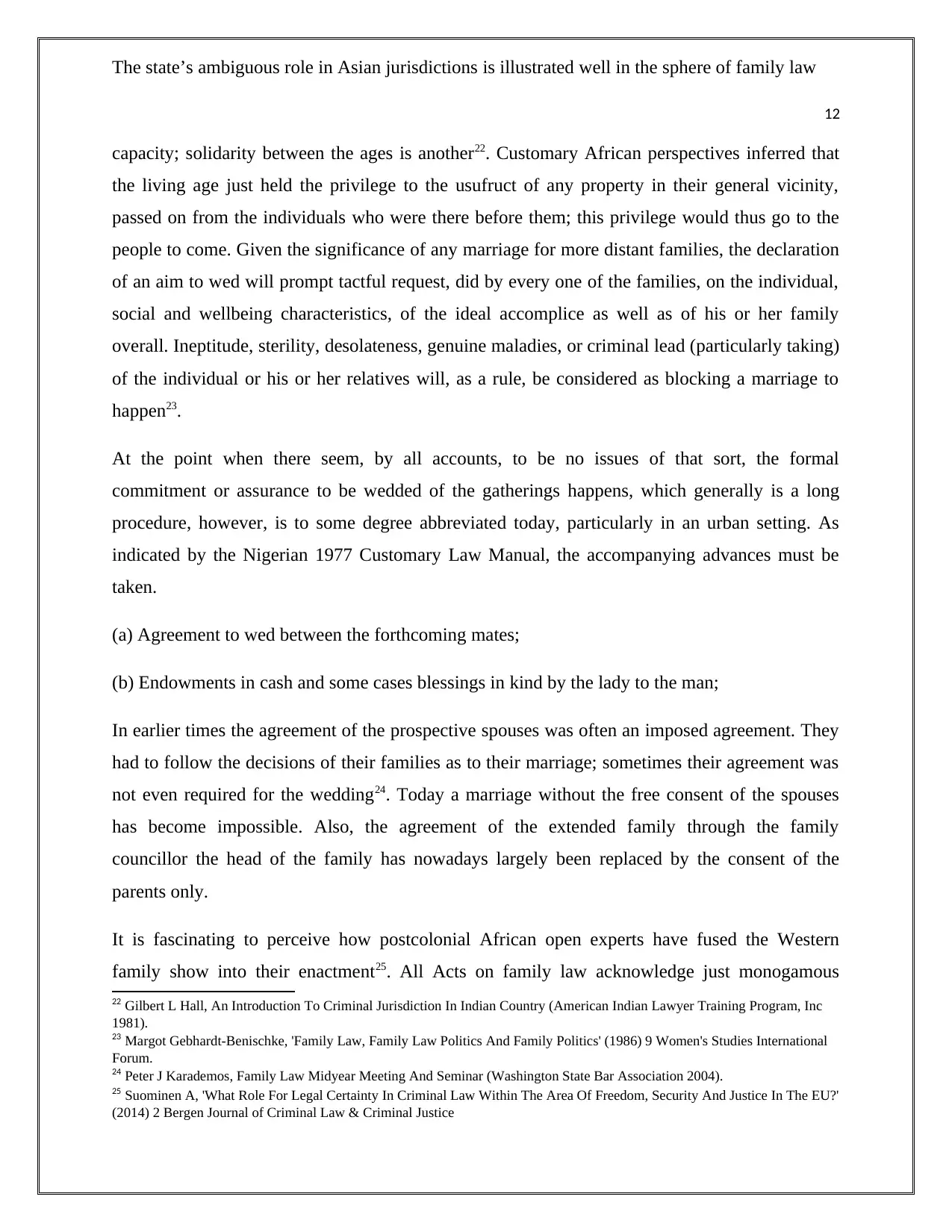
The state’s ambiguous role in Asian jurisdictions is illustrated well in the sphere of family law
12
capacity; solidarity between the ages is another22. Customary African perspectives inferred that
the living age just held the privilege to the usufruct of any property in their general vicinity,
passed on from the individuals who were there before them; this privilege would thus go to the
people to come. Given the significance of any marriage for more distant families, the declaration
of an aim to wed will prompt tactful request, did by every one of the families, on the individual,
social and wellbeing characteristics, of the ideal accomplice as well as of his or her family
overall. Ineptitude, sterility, desolateness, genuine maladies, or criminal lead (particularly taking)
of the individual or his or her relatives will, as a rule, be considered as blocking a marriage to
happen23.
At the point when there seem, by all accounts, to be no issues of that sort, the formal
commitment or assurance to be wedded of the gatherings happens, which generally is a long
procedure, however, is to some degree abbreviated today, particularly in an urban setting. As
indicated by the Nigerian 1977 Customary Law Manual, the accompanying advances must be
taken.
(a) Agreement to wed between the forthcoming mates;
(b) Endowments in cash and some cases blessings in kind by the lady to the man;
In earlier times the agreement of the prospective spouses was often an imposed agreement. They
had to follow the decisions of their families as to their marriage; sometimes their agreement was
not even required for the wedding24. Today a marriage without the free consent of the spouses
has become impossible. Also, the agreement of the extended family through the family
councillor the head of the family has nowadays largely been replaced by the consent of the
parents only.
It is fascinating to perceive how postcolonial African open experts have fused the Western
family show into their enactment25. All Acts on family law acknowledge just monogamous
22 Gilbert L Hall, An Introduction To Criminal Jurisdiction In Indian Country (American Indian Lawyer Training Program, Inc
1981).
23 Margot Gebhardt-Benischke, 'Family Law, Family Law Politics And Family Politics' (1986) 9 Women's Studies International
Forum.
24 Peter J Karademos, Family Law Midyear Meeting And Seminar (Washington State Bar Association 2004).
25 Suominen A, 'What Role For Legal Certainty In Criminal Law Within The Area Of Freedom, Security And Justice In The EU?'
(2014) 2 Bergen Journal of Criminal Law & Criminal Justice
12
capacity; solidarity between the ages is another22. Customary African perspectives inferred that
the living age just held the privilege to the usufruct of any property in their general vicinity,
passed on from the individuals who were there before them; this privilege would thus go to the
people to come. Given the significance of any marriage for more distant families, the declaration
of an aim to wed will prompt tactful request, did by every one of the families, on the individual,
social and wellbeing characteristics, of the ideal accomplice as well as of his or her family
overall. Ineptitude, sterility, desolateness, genuine maladies, or criminal lead (particularly taking)
of the individual or his or her relatives will, as a rule, be considered as blocking a marriage to
happen23.
At the point when there seem, by all accounts, to be no issues of that sort, the formal
commitment or assurance to be wedded of the gatherings happens, which generally is a long
procedure, however, is to some degree abbreviated today, particularly in an urban setting. As
indicated by the Nigerian 1977 Customary Law Manual, the accompanying advances must be
taken.
(a) Agreement to wed between the forthcoming mates;
(b) Endowments in cash and some cases blessings in kind by the lady to the man;
In earlier times the agreement of the prospective spouses was often an imposed agreement. They
had to follow the decisions of their families as to their marriage; sometimes their agreement was
not even required for the wedding24. Today a marriage without the free consent of the spouses
has become impossible. Also, the agreement of the extended family through the family
councillor the head of the family has nowadays largely been replaced by the consent of the
parents only.
It is fascinating to perceive how postcolonial African open experts have fused the Western
family show into their enactment25. All Acts on family law acknowledge just monogamous
22 Gilbert L Hall, An Introduction To Criminal Jurisdiction In Indian Country (American Indian Lawyer Training Program, Inc
1981).
23 Margot Gebhardt-Benischke, 'Family Law, Family Law Politics And Family Politics' (1986) 9 Women's Studies International
Forum.
24 Peter J Karademos, Family Law Midyear Meeting And Seminar (Washington State Bar Association 2004).
25 Suominen A, 'What Role For Legal Certainty In Criminal Law Within The Area Of Freedom, Security And Justice In The EU?'
(2014) 2 Bergen Journal of Criminal Law & Criminal Justice
⊘ This is a preview!⊘
Do you want full access?
Subscribe today to unlock all pages.

Trusted by 1+ million students worldwide
1 out of 19
Related Documents
Your All-in-One AI-Powered Toolkit for Academic Success.
+13062052269
info@desklib.com
Available 24*7 on WhatsApp / Email
![[object Object]](/_next/static/media/star-bottom.7253800d.svg)
Unlock your academic potential
Copyright © 2020–2026 A2Z Services. All Rights Reserved. Developed and managed by ZUCOL.



